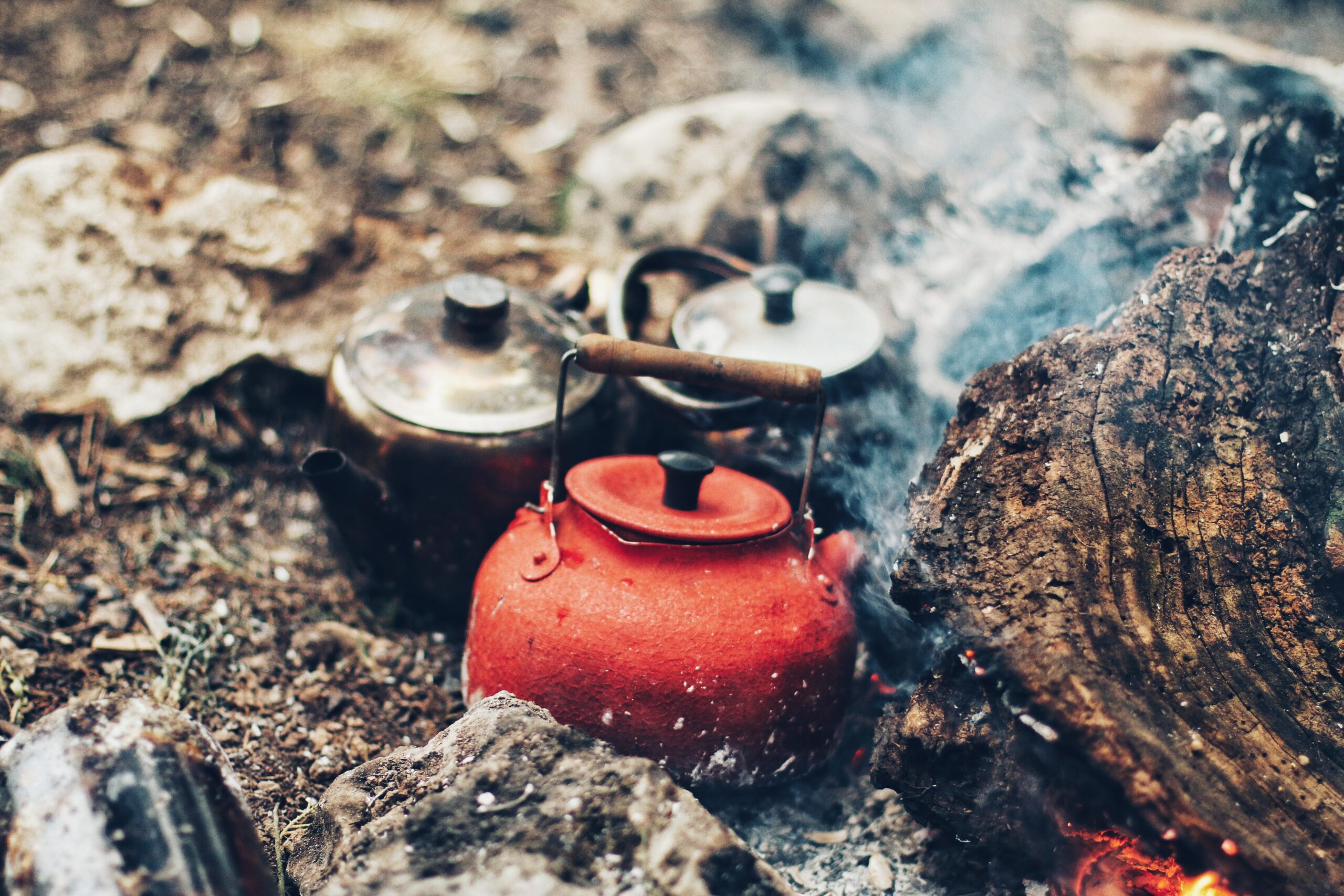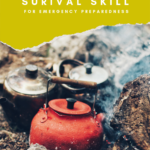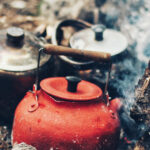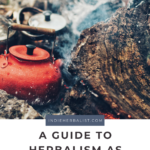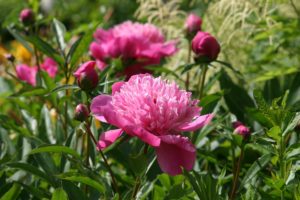Links contained in this post and elsewhere on my website may include affiliate links. When you make a purchase through these links, I earn a commission at no additional cost to you. I only link to products and services that I love - and that I think you will love, too!
Should herbalism have a place on your list of survival skills? I think so! My main interest in herbalism is actually mainly in community wellness in austere environments. These are situations where herbalism and survival may have reasons to overlap. Below, I’ve outlined the basic skills you should consider and how to get started.
From what I’ve seen in the preparedness community, it’s common to find two extreme mindsets regarding herbs. The first is overconfidence. People in this camp tend to think: “When things go to hell in a handbasket, I’ll be able to treat myself with plants. Who needs doctors!? I have this field guide!”
The second mindset is along the lines of “Using plants for anything is a bunch of HOGWASH.” If that’s the case for you, well, I’m not here to convince you to take plants seriously. I’m more interested in applying the brakes on some of the over-zealousness I’ve witnessed and teaching applicable skills that will increase the safety and effectiveness of herbs as a backup plan.
The most important herbal survival skills are the ones you practice
Incorporating plants into your lifestyle now, while there’s no pressure, is a really smart way to approach herbalism as a survival skill. The easiest, least expensive way to start is by learning to make tea. Herbalists make a distinction between infusions (for leaves and flowers) and decoctions (for roots, berries, and barks).
Here are some other useful preparations to learn:
- extracts
- salves
- syrup
- vinegar
- infused oils
- poultices
- compresses
Once you’ve learned how to make things with herbs, you can begin working on herbal theory. This will provide you with the principles to make skilled decisions about which herbs are best in a given scenario.
Master basic herbal theory for best results
Once you take a look at whether you can spot good information vs bad information, ask yourself this: do you have a grasp of basic herbal theory? This includes things like
- knowing how much of an herb to use and in what form
- being able to decide when it’s best to use one herb over another
- understanding how an herbalist assesses the condition of the body
Begin learning more complex herbal skills
If you have a good grasp of basic herbal theory, you may be ready for more advanced herbal theory. Advanced herbal theory covers information like how to create a targeted herbal formula, and how to describe what a person is going through in ways that can be matched with specific plants.
Throwing together 15 herbs that one book listed together under “flu” and calling it a day doesn’t count! This is where you start to add finesse. You’re not a doctor, you shouldn’t focus on diagnosing disease. (More on that later). You can, however, learn to describe the state of balance in the body- how is a person experiencing health or discomfort?
This is an extremely important skill to have, as it provides an entirely different way to understand the human body that is immediately accessible for laypeople when medical diagnostic tools are not available.
You should study overall constitutional analysis, too. Again, this is where you start to have a better grasp of the body and how it responds to itself and to its environment. Herbs can be grouped according to how they affect overall balance within the human body as well.
Fine-tuning your BS detector is also an important survival skill
Don’t take herbal information at face value. Ask questions. Lots of questions. For one thing, it’s good to take into account how much detail is being provided. It’s important to look for specifics:
- what’s the binomial (scientific name) of the plant being discussed?
- what part is being used, and in what form?
- what claims are being made about the herb’s actions?
Of course, where the information is coming from is also important.
- Does the source provide references?
- Is the information historically based?
- Does it reflect modern findings?
- Is the author providing credible first-hand experience?
- Or is it simple conjecture?
A stranger making claims on social media about how they use an herb is not a reliable source. Be especially wary if someone is claiming to have found a new and different use for a plant that isn’t backed up by historical use or modern research.
Herbalists will often compare notes on individual uses and come up with interesting findings this way, but I’ve also seen people make really random, far-out there claims based on one instance of use. There’s no reason to think that it was the herb that made the difference in these cases.
Also, always compare notes from several different sources, and don’t rely heavily on one expert. Check up on credentials. Read bibliographies. How many sources does the author or speaker reference? This can lead you to even more great info.
Understanding the difference between herbalism and medicine is important
While we are on the topic of finding good information: do you understand the difference between herbalism and medicine? In the US, making medical claims regarding an herb and/or stating that is recommended for a disease or that it can cure ANYTHING is a recipe for trouble. Depending on how it is presented, not only could it be construed as Practicing Medicine Without A License (which is illegal), but herbs are regulated as dietary supplements- not medicines- which protects our access to them.
Anytime you hear an herbalist using words like “treat, diagnose, disease, medicine, remedy” etc- perk up your ears. Herbalists in the United States shouldn’t make medical claims or drug claims about herbs. It’s outside our scope of practice. A couple things could be going on. They may be an herbalist from overseas or an MD who also happens to have an interest in herbs. If that’s the case, great!
Or they could simply be demonstrating misinformation or misunderstanding. Surprisingly, even though it may initially make someone sound very educated and in the know, using medical jargon sometimes disguises a depth of knowledge that is lacking.
It’s not just a matter of semantics when we say herbs aren’t medicines. Herbs work differently and require a different skill set.
Sometimes, it’s not a case of ignorance, but rather a case of arrogance. Rrun the other way! Chances are, they don’t know as much as they think they do, and I certainly wouldn’t want to trust my health backup plan to someone with a weird complex about being the herbal savior of humanity.

Foraging survival skills
Foraging can be a useful survival skill, but it’s not as easy as most people think. Nature runs on her own schedule, so don’t expect everything to be at your beck and call during an emergency. It’s better to have herbal supplies stored with your food and medical preps. However, it’s still a useful skill!
That being said, you need to learn to do it the right way. Being able to properly identify a plant based on the minute details botanists use isn’t busy work. It can be a matter of life and death. The four plants below look very similar, even to experienced foragers and herbalists. One of them is a deadly poison. Do you know which one?
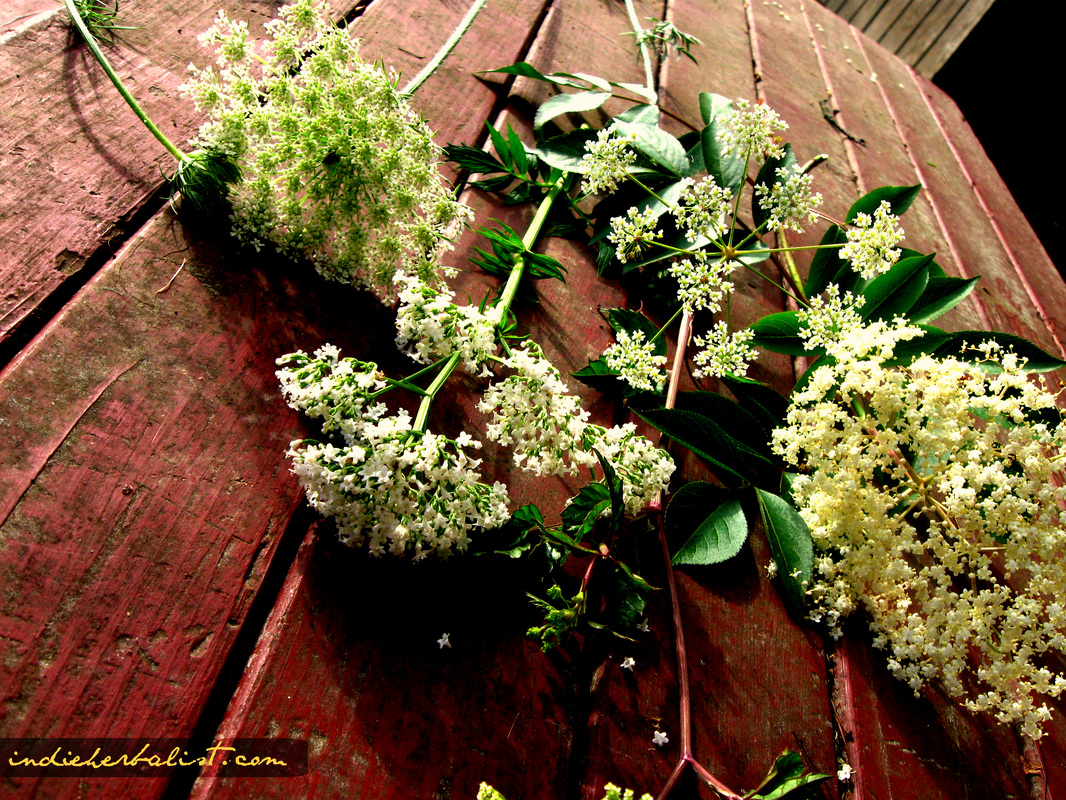
See what I mean? You need to understand differences in leaf shapes, stems, flowers, and growing habits to be able to grow and gather your own plant material. The best resource I know of to quickly get you on your feet here is Botany in A Day (sponsored). Read it. In one sitting. And then refer back to it as needed.
In case you are wondering, the plants above are (from left to right) wild carrot, valerian, water hemlock (the poison), and elder. Technically, elder has some toxicity in the leaves and bark. It will upset your stomach if you use it raw. Water hemlock is lethal.
Water hemlock and wild carrot are the two most likely to get confused, as the root of wild carrot is often sought out by foragers. And don’t start any of that “I’ll know if it’s poisonous ’cause it’ll taste bad” or “I’ll just watch what the animals eat,” BS with me. Some of the people who have had the good fortune to survive a brush with hemlock comment on the flavor. It’s apparently quite tasty even though a bite or two will kill you quite dead.
And case in point about animals, cows and horses certainly don’t have the good sense to avoid it. Good pasture management involves making sure your livestock doesn’t have access to it.
What level of first aid can you provide?
Last but not least, it’s also a good idea to learn first aid skills. In the kinds of settings where herbalism qualifies as a survival skill, it’s best to know wilderness first aid.
Taking a course will be essential to help you learn this skill. Get a good handbook to store with your preps. I keep a copy of The Herbal Medic by Sam Coffman in with mine, and it’s a great resource.
Herbal survival skills for austere environments
So, how do you feel about adding herbalism to your survival skills? The topics we covered today will help you assess where you can improve your herbal preparedness skills and give you some ideas on what steps to take next. The point is, you don’t want to think you are prepared just because you know a little. Herbalism has so much potential, and it’s a shame to miss out on that!
Photo by Soroush Karimi on Unsplash
Photo by Agatha Noveille
